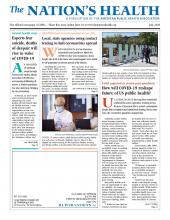Delaying the morning start time of school can reduce sleep deprivation among teens, an April study in JAMA Pediatrics finds.
While adolescents should get at least eight hours of sleep a night, many do not. Rachel Widome, PhD, MHS, lead author of the study, said there is a “sleep bottleneck” that makes getting necessary sleep nearly impossible for adolescents.
Researchers examined the sleep habits of students, who had an average age of 15, attending five schools in the Minnesota-St. Paul region. All of the schools initially started classes around 7:30 a.m. But beginning in 2016, two of the schools started classes about one hour later. At the schools with later start times, researchers found that students were more rested than the students coming to class earlier at the other schools.
“You might think that when schools start later, any benefit would be canceled by teens compensating by just going to bed later, but that’s not what we observed,” Widome, an associate professor of epidemiology and community health at the University of Minnesota, told The Nation’s Health.
At the schools starting later in the morning, students reported they went to bed at similar times and slept longer the next morning. The students also tended not to oversleep on the weekend, when they would normally be making up for lost sleep.
“Giving adolescents opportunities to get more sleep is important because the vast majority of U.S. teens fall short of what we would consider adequate nightly rest,” Widome said. “This impacts their behaviors and mood, harms their health, and jeopardizes their well-being.”
According to the Centers for Disease Control and Prevention, fewer than 8 percent of school districts have high schools that start at 8:30 a.m. or later, a time that is recommended by the American Academy of Pediatrics.
The COVID-19 pandemic has forced many districts to switch to distance learning, which may enable students to get more sleep because they do not have to commute to school. But when in-person classes resume, many students with early schedules may end up sleep-deprived, Widome said.
“Parents of teens who attend early-starting schools can plan to work with teens to free up as much of their morning for sleep, perhaps by streamlining morning routines or getting chores and homework complete in the afternoons, rather than in the morning before school,” Widome said.
To read the study, visit https://jamanetwork.com/journals/jamapediatrics.
- Copyright The Nation’s Health, American Public Health Association









